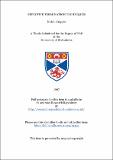Files in this item
Effective termination techniques
Item metadata
| dc.contributor.advisor | Martin, Ursula | |
| dc.contributor.author | Cropper, Nick I. | |
| dc.coverage.spatial | 116 p. | en_US |
| dc.date.accessioned | 2018-05-22T11:36:33Z | |
| dc.date.available | 2018-05-22T11:36:33Z | |
| dc.date.issued | 1997 | |
| dc.identifier.uri | https://hdl.handle.net/10023/13453 | |
| dc.description.abstract | An important property of term rewriting systems is termination: the guarantee that every rewrite sequence is finite. This thesis is concerned with orderings used for proving termination, in particular the Knuth-Bendix and polynomial orderings. First, two methods for generating termination orderings are enhanced. The Knuth-Bendix ordering algorithm incrementally generates numeric and symbolic constraints that are sufficient for the termination of the rewrite system being constructed. The KB ordering algorithm requires an efficient linear constraint solver that detects the nature of degeneracy in the solution space, and for this a revised method of complete description is presented that eliminates the space redundancy that crippled previous implementations. Polynomial orderings are more powerful than Knuth-Bendix orderings, but are usually much harder to generate. Rewrite systems consisting of only a handful of rules can overwhelm existing search techniques due to the combinatorial complexity. A genetic algorithm is applied with some success. Second, a subset of the family of polynomial orderings is analysed. The polynomial orderings on terms in two unary function symbols are fully resolved into simpler orderings. Thus it is shown that most of the complexity of polynomial orderings is redundant. The order type (logical invariant), either r or A (numeric invariant), and precedence is calculated for each polynomial ordering. The invariants correspond in a natural way to the parameters of the orderings, and so the tabulated results can be used to convert easily between polynomial orderings and more tangible orderings. The orderings of order type are two of the recursive path orderings. All of the other polynomial orderings are of order type w or w2 and each can be expressed as a lexicographic combination of r (weight), A (matrix), and lexicographic (dictionary) orderings. The thesis concludes by showing how the analysis extends to arbitrary monadic terms, and discussing possible developments for the future. | en_US |
| dc.language.iso | en | en_US |
| dc.publisher | University of St Andrews | |
| dc.subject.lcc | QA76.76T4C8 | |
| dc.subject.lcsh | Electronic data processing. | En |
| dc.title | Effective termination techniques | en_US |
| dc.type | Thesis | en_US |
| dc.type.qualificationlevel | Doctoral | en_US |
| dc.type.qualificationname | PhD Doctor of Philosophy | en_US |
| dc.publisher.institution | The University of St Andrews | en_US |
This item appears in the following Collection(s)
Items in the St Andrews Research Repository are protected by copyright, with all rights reserved, unless otherwise indicated.

